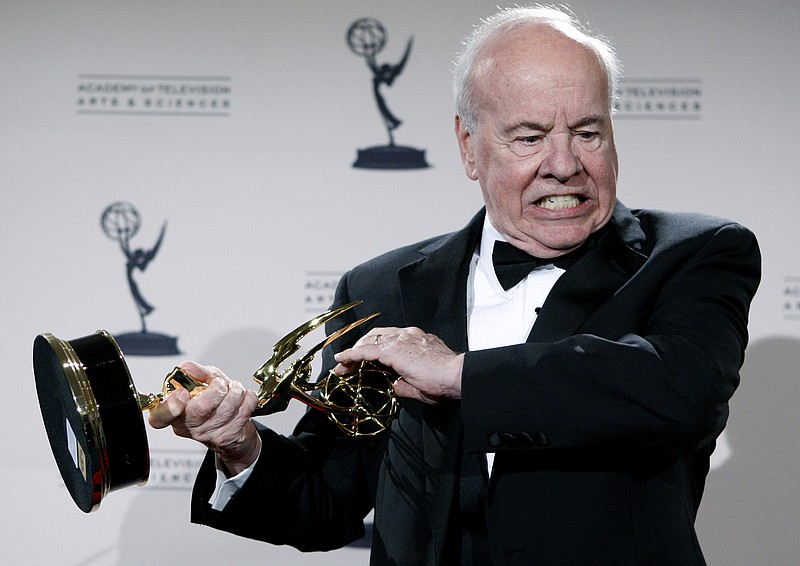The widespread sadness over the death of comedian Tim Conway last week made us wonder if today's Americans have lost their collective sense of humor.
Seasoned citizens who watched his antics on "The Carol Burnett Show," which last aired regularly 41 years ago, or younger people who have seen clips of him on YouTube or on various comedy retrospectives seem to understand he represented something that is no longer present.
Conway, whose work ranged from television to movies to videotape with his "Dorf" how-to series, was never mean or political with his humor.
"We really didn't attack people or politics or religion or whatever," he once said. "We just made fun of, basically, ourselves."
Conway once even poked fun at himself by ordering a car license plate that reflected the duration of many of his pre-Burnett television series: "13 WKS."
Ah, making fun of ourselves.
Today, people are too busy looking for ways to be offended to make fun of themselves.
They're offended if someone doesn't share their sympathy for a cause, offended if someone doesn't believe in making race a crutch, offended if someone doesn't hate the politician they do, offended if someone cites their faith in their reasoning, offended if someone doesn't share their climate change theory.
If people are constantly looking for ways to be offended, they have placed themselves alone in the dead center of their world and have become enslaved there. They are unable to leave that world because they are unable to look outward.
To make fun of ourselves, we must look outward to see which of our foibles we can exploit.
Conway's humor did that.
He imagined himself, just to name a few characters, as an old man, as frustrated businessman Mr. Tudball having to put up with airhead secretary Mrs. Wiggins, and as a rookie dentist not quite ready for prime time.
Better yet for the Burnett show, while Conway and fellow co-star Harvey Korman were serious about their comedy, they weren't so serious that one's actions couldn't break up the other. Millions of viewers tuned in each week to see if the pair could get through a comedy sketch without laughing.
Burnett and others have said such a show couldn't be made today because of the cost. But we wonder if it couldn't be made today because it didn't offend. Today's prime time shows, and those on cable and other platforms, don't offer the clean humor that comedy variety shows did 40 years ago. If today's fare isn't spewing hate about President Trump, Republicans and Christians, it's promoting all manner of what might politely be called non-traditional lifestyles.
Two NBC television programs, one that began during the waning years of the Burnett show and one that predated it, are examples of where comedy has moved.
"Saturday Night Live, which premiered in 1975, began as an edgier version of the tried and true comedy/variety show. Its stars imagined themselves as a variety of characters, even as then-President Gerald Ford. But the Ford character was never lampooned on the show for his political stances but for the several accidents he suffered on ski slopes or airplane stairs.
Now the show does not air without Trump and his policies being portrayed as wrong-headed, illegal or immoral. Some humor.
"The Tonight Show," meanwhile, always engaged in topical humor but traditionally with the host in the mien of an observer: "Did you hear what happened at the White House today ... " "A new law about nudity went into effect yesterday, but something quickly went wrong ... " "The U.S. Army ordered 600,000 new toilet seats recently, and ... "
Now that show and its late-night clones on network television serve up the same, tired drivel against the same people - Republicans, people of faith and anyone who's not politically correct.
The irony is the same people who don't mind hearing jokes about certain segments of the population are the first ones to say they are offended if a joke is made in their direction.
Conway himself was baffled at how comedy has fallen - and even needed a joke to relate his feelings.
"There are very few funny people nowadays," he said in an interview with Bookish when he was promoting his 2013 memoir, "What's So Funny? My Hilarious Life." "I don't understand these young kids who go out and stand in front of people with the language they [use]. I don't approve of that at all. Though I swear quite a bit - just with my children at home. But the punchline of a joke is not a swear word, in my book."
Reader's Digest, a magazine that was a staple in many Greatest Generation households and still exists today, has had for years a section called "Laughter Is The Best Medicine."
In our hyper-partisan, offended, pent-up, politically correct lives, we could use a little bit of that medicine. Thanks, Tim Conway, for showing us the way.
